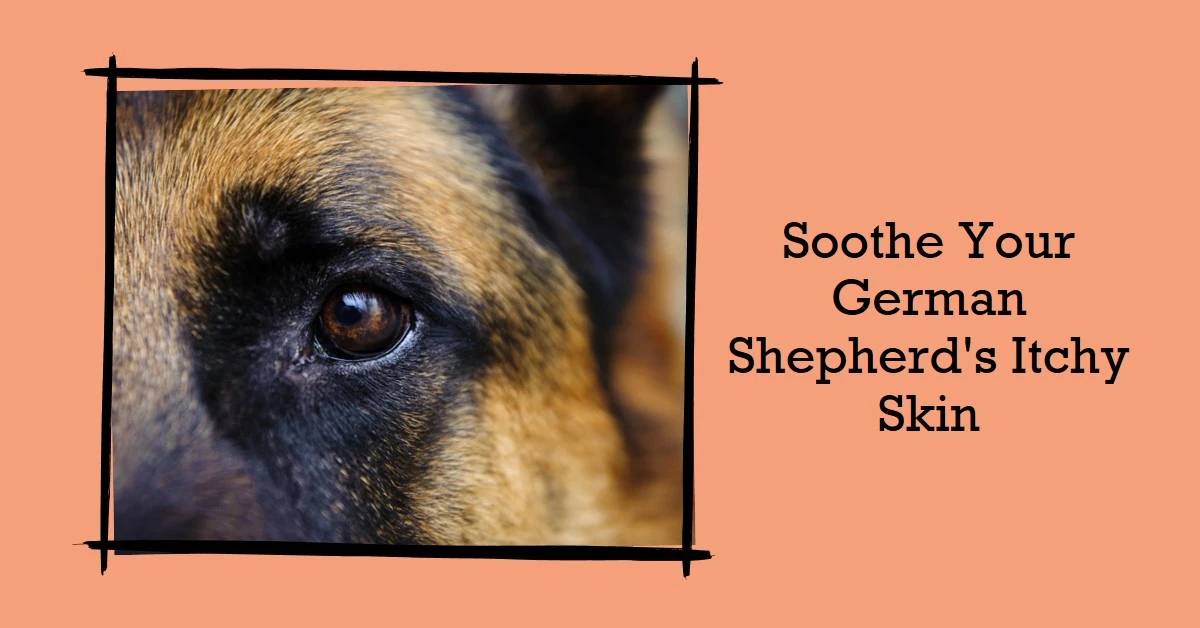Why Does My German Shepherd Itch So Much?

Your German Shepherd’s excessive itching, manifested through frequent scratching, chewing, or biting, can be attributed to common causes such as skin allergies, flea infestations, or skin infections.
It is crucial to consult a veterinarian to accurately diagnose and address the root cause of this irritating problem, ensuring effective treatment and relief for your dog’s discomfort while managing any underlying conditions.
Understanding and Managing Your German Shepherd’s Itching
German Shepherds, like many breeds, can suffer from various skin issues that lead to excessive itching. This discomfort can be caused by multiple factors, from allergies to infections.
As a pet owner, it’s essential to recognize the signs and understand the potential causes to ensure your furry friend gets the proper care.
The table below provides a comprehensive overview of common causes of itching in German Shepherds and their corresponding solutions, offering valuable insights into effective management and relief strategies.
| Causes | Solutions |
|---|---|
| Flea Allergy Dermatitis | Controlling fleas, veterinary intervention for flea allergy reactions. |
| Food Allergies | Elimination diet trial, hypoallergenic dog food. |
| Environmental Allergens | Limiting exposure, antihistamines, medicated shampoos, and immunotherapy. |
| Bacterial or Yeast Infections | Antibiotics, antifungals, and medicated shampoos for underlying infections. |
| Parasites | Topical and oral parasiticides treat other pets to prevent re-infestation. |
| Immune Disorders | Immune-modulating therapies and symptom management. |
Common Causes of Itching in German Shepherds
Some common triggers can cause itching and skin irritation in German Shepherds. Identifying the specific source is essential in relieving discomfort and getting appropriate treatment.
Flea Allergy Dermatitis
One of the German Shepherds’ most prevalent itching triggers is flea allergy dermatitis.
German Shepherds tend to be highly allergic to flea saliva, and just a few bites can set off severe itching, redness, and skin irritation.
Despite successful flea treatment, symptoms may persist for weeks due to an immune response to the flea saliva allergen.
Controlling fleas and pursuing veterinary intervention for flea allergy reactions are crucial.
Food Allergies
Itchy skin is a common problem among German Shepherds, and food allergies are one of the familiar sources.
Beef, chicken, corn, wheat, and soy are frequent culprits that cause food allergies. Symptoms usually develop slowly over time and may include gastrointestinal issues.
An elimination diet trial is the most common way to diagnose food allergies.
Once the problematic ingredients are identified, hypoallergenic dog food can effectively manage food allergies and related skin irritation.
Environmental Allergens
Allergies to things in their environment, like dust mites, molds, and pollens, can also make your German Shepherd’s skin itchy and uncomfortable.
Red, irritated skin and frequent ear infections are typical signs. Limiting exposure to triggers, antihistamines, medicated shampoos, and immunotherapy shots may relieve environmental allergen reactions.
Bacterial or Yeast Infections
Secondary infections with bacteria or yeast are common complications that can worsen itching.
Allergic reactions damage the skin barrier, making dogs prone to infection. Red, smelly skin and greasy coat patches signal this problem.
Antibiotics, antifungals, and medicated shampoos treat underlying infections aggravating your dog’s skin discomfort.
Parasites
Skin parasites such as mange mites and lice can cause severe itching and irritation in German Shepherds.
If you notice hair loss, redness, scabs, or sores on your dog, it may be a sign of parasitic infection.
The infected dog should be prescribed topical and oral parasiticides to eliminate mites or lice and promote skin healing.
It is also essential to treat any other pets in the household to prevent re-infestation.
Immune Disorders
In rare cases, immune system disorders may be behind recurring skin and ear issues.
Autoimmune disease or immune deficiency can be investigated as a cause if other triggers are ruled out.
Immune-modulating therapies and symptom management control this very itchy and frustrating source of skin problems.
Signs Your German Shepherd’s Itching Needs the Vet’s Attention
- Excessive Paw Licking and Chewing
- Red, Oozy Skin Lesions
- Bald Patches From Scratching or Rubbing
- Head-Shaking and Ear-scratching
- Skin that Looks Scaly or Leathery
- Strong Odor Coming From Coat
- Changes in Behavior Like Irritability
If you notice any of these issues, contact your vet for an urgent appointment. Leaving chronic itching untreated allows the problem to worsen.
Short-Term Itch Relief Solutions
While identifying and addressing the underlying source of itching is crucial, you can take some immediate steps at home to help relieve your German Shepherd’s urge to scratch until veterinary treatment resolves the root cause.
Oatmeal or Soothing Baths
Bath your German Shepherd using a gentle, anti-itch formula containing colloidal oatmeal, aloe vera, or hydrocortisone to help calm inflammation. Avoid hot water, which dries the skin.
Apply Cold Compresses
Place a cold, wet towel on irritated areas to numb itchiness and reduce swelling. You can also try wrapped ice packs.
Massage Itchy Areas
Gently massage your dog’s skin with a few drops of coconut or olive oil to moisturize, ease inflammation, and provide comfort.
Limit Scratching
Use an Elizabethan collar and dog socks to prevent damage from scratching. Distract them with toys and exercise when they start biting at their paws or belly.
Use Anti-Itch Sprays or Shampoos
OTC hydrocortisone sprays and anti-itch shampoos with pramoxine provide temporary relief between vet visits. Follow the label instructions carefully.
Long-Term Itch Management Tips
Alongside any prescribed treatments from your vet, use these proactive strategies to help reduce flare-ups of itching and skin issues in your German Shepherd long-term:
Identify and Avoid Triggers
Pinpoint what environments, foods, products, etc, trigger episodes and limit exposure. Keep a journal of your dog’s flare-ups and suspected causes.
Stick to a Hypoallergenic Diet
Feeding your pet with a limited-ingredient, grain-free diet recommended by a veterinarian can help reduce allergy triggers and promote healthier skin.
Groom Frequently
To prevent the buildup of dead hair and skin, it is essential to regularly brush and bathe your pet and ensure their coat is completely dry.
Apply Preventive Flea & Tick Medication
Use monthly spot-on or oral preventives year-round to repel external parasites that could stir up itching. Examine their skin for signs of any infestation.
Clean Feet After Outdoor Activity
Wipe down paws with a damp cloth and dry thoroughly after walks to remove pollen and other environmental allergens.
Invest in an Air Purifier
High-efficiency HEPA air filters help capture irritating particles and allergens circulating indoors, triggering skin reactions.
Try Probiotic Supplements
Probiotic strains like Lactobacillus may reduce allergic reactions. Consult your vet before starting supplements.
Stick to a Soothing Topical Routine
Bathe regularly with gentle formulas. Apply moisturizing creams afterward to nourish the skin barrier. Discontinue any products that seem to worsen itching.
Veterinary intervention is critical if your German Shepherd’s itching persists or severely impacts your quality of life.
Therapies like allergy testing, immunotherapy, or medications can improve their comfort. With diligent management, you can help minimize annoying itchiness and keep your dog happy and active.
Final Thoughts on Soothing Your Itchy German Shepherd
While occasional scratching is frequent and intense, itching in German Shepherds usually indicates an underlying problem requiring veterinary diagnosis and care.
Common triggers like allergies, parasites, infections, and immune diseases must be appropriately identified and treated.
Strategic management at home and medical therapy prescribed by your vet work hand in hand to control irritation and discomfort.
Prioritize getting to the root cause, provide lots of TLC, and follow treatment plans closely to help your beloved German Shepherd find lasting itch relief.

I’m Martin, and I grew up in the super cool city of Seattle. You know, the place with all the incredible mountains and forests? Yeah, that’s my playground!
Ever since I was little, I’ve been all about nature. I used to wander around the woods with a notebook, doodling all the cool plants and animals I’d find.
